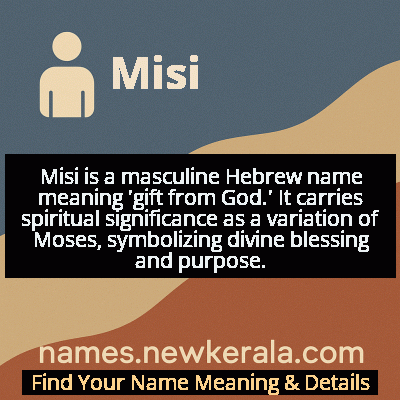Misi Name Meaning & Details
Origin, Popularity, Numerology Analysis & Name Meaning of Misi
Discover the origin, meaning, and cultural significance of the name MISI. Delve into its historical roots and explore the lasting impact it has had on communities and traditions.
Name
Misi
Gender
Male
Origin
Hebrew
Lucky Number
5
Meaning of the Name - Misi
Misi is a masculine Hebrew name meaning 'gift from God.' It carries spiritual significance as a variation of Moses, symbolizing divine blessing and purpose.
Misi - Complete Numerology Analysis
Your Numerology Number
Based on Pythagorean Numerology System
Ruling Planet
Mercury
Positive Nature
Adventurous, dynamic, curious, and social.
Negative Traits
Restless, impatient, inconsistent, prone to indulgence.
Lucky Colours
Green, white.
Lucky Days
Wednesday.
Lucky Stones
Emerald.
Harmony Numbers
1, 3, 9.
Best Suited Professions
Sales, marketing, travel, entertainment.
What People Like About You
Versatility, charisma, adventurous spirit.
Famous People Named Misi
Misi Taulapapa
Professional Football Player
NFL running back who played for multiple teams including the San Francisco 49ers and Arizona Cardinals
Misi Ailama
Religious Leader
Influential Samoan pastor and community leader who established several churches in the Pacific Islands
Misi Tupe
Rugby Player
Professional rugby player known for his powerful performances in New Zealand's domestic competitions
Name Variations & International Equivalents
Click on blue names to explore their detailed meanings. Gray names with will be available soon.
Cultural & Historical Significance
In Pacific Island cultures, particularly in Samoa, Misi has been adopted as a common given name while retaining its biblical significance. Here it represents both Christian faith and cultural identity, often given to boys expected to become spiritual leaders or community pillars. The name bridges ancient Hebrew tradition with contemporary Pacific Island Christian practices, creating a unique cultural fusion that honors both heritage and faith.
Extended Personality Analysis
Individuals named Misi are often perceived as natural leaders with strong moral compasses and a deep sense of purpose. They tend to be protective, responsible, and guided by strong principles, much like the biblical figure Moses who led his people with conviction and faith. These individuals often exhibit wisdom beyond their years and possess an innate ability to guide others through challenging situations.
Misi's are typically compassionate and empathetic, with a genuine concern for the wellbeing of others. They combine practical problem-solving skills with spiritual depth, making them excellent mediators and counselors. While they can be determined and sometimes stubborn in their convictions, this stems from their strong belief in justice and doing what's right. Their presence often brings a sense of stability and trust to any group or situation.
Modern Usage & Popularity
In contemporary times, Misi maintains moderate popularity within Christian communities, particularly among Pacific Island populations in New Zealand, Australia, and the United States. While not among the top-ranking names globally, it enjoys consistent usage as both a given name and nickname. The name has seen a resurgence in recent years as parents seek meaningful biblical names with cultural significance. Its usage spans various Christian denominations and is particularly favored by families wanting to honor both their faith and cultural heritage.
Symbolic & Spiritual Meanings
Symbolically, Misi represents divine guidance, protection, and leadership. Like Moses parting the Red Sea, the name symbolizes overcoming impossible obstacles through faith and determination. It carries connotations of being chosen for a higher purpose and serving as an instrument of divine will. The name also embodies the concept of liberation - freeing oneself and others from bondage, whether physical, spiritual, or emotional. In modern interpretation, Misi symbolizes the bridge between ancient wisdom and contemporary challenges, representing someone who carries timeless truths into the modern world.

